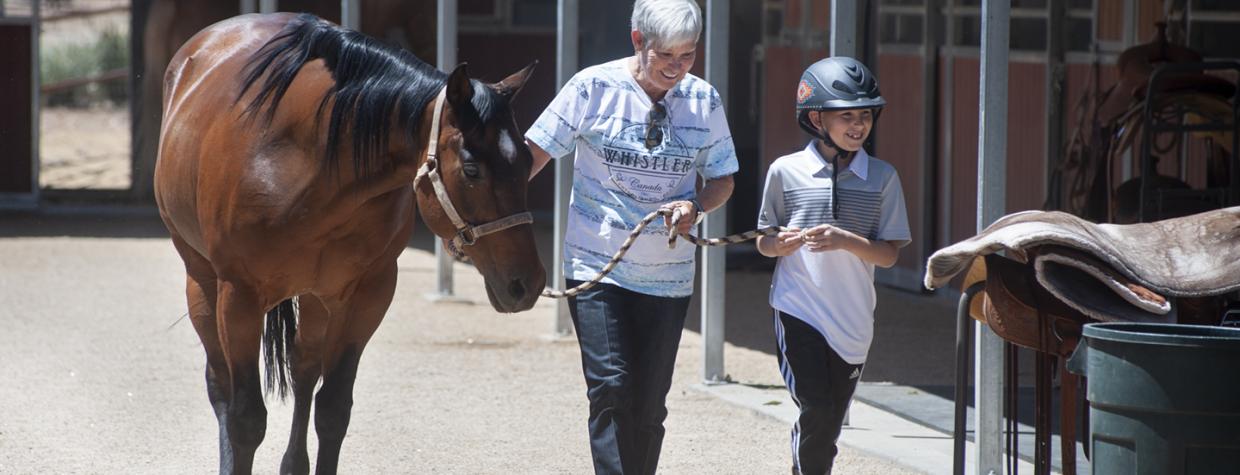A metal ramada, equipped with industrial-grade ceiling fans, stands tall and juts out into the desert landscape of Cave Creek, Arizona, covering a large patch of dirt. An unpaved driveway leads to a small outdoor office space where parents, children and volunteers crowd around, peering out onto the enclosure, where three riders on horseback pace around an elaborate obstacle course.
At the center of it all is Debra Kermott, director of Silver Spur Therapeutic Riding Center. Kermott started Silver Spur back in 2009, when she was still living in Utah, before relocating to Cave Creek in 2020. Her background in education and music therapy, coupled with her husband’s lifelong interest in horses, pushed her to explore equine-assisted therapy.
Every Saturday morning, nine riders and their families come to Silver Spur for lessons, trotting along trails and learning to care for their horses. Each of Kermott’s horses has a unique walk and personality, and Kennott pairs each rider with a horse depending on the rider’s specific needs. Silver Spur partners with a physical therapy group called Total Pediatric Therapy to get many of their riders, and Kermott says she’s always in talks with the riders’ physical therapists to determine an equine care model specific to each rider’s situation.
As a horse walks, the rider’s hips are swaying back and forth, an activity that works out the rider’s core. Riders are also taught to rotate their thumbs upward and guide their horse through neck reining, or motivating the horse to move by pressing their legs into its side.
“The legs do a lot of the commanding for the horse,” Kermott says. “Well, if somebody has cerebral palsy, we get this rotation out, which helps them walk better.”
In the late-morning Saturday breeze, Andrea Wilson wears her gray Silver Spur volunteer polo shirt and watches her family swirling around the Silver Spur lot. Her mother, father, daughter, son and husband all volunteer for Silver Spur, while her youngest daughter, Phoenix, takes lessons on the weekends.
Above all, Silver Spur is a family environment, Wilson says, adding that Phoenix feels comfortable talking to any of the volunteers about how she’s feeling and that the environment “teaches her to be a good advocate for herself.” It doesn’t feel like physical therapy, Wilson adds; it just feels like fun.
Kajsa Farnsworth and her son Brady have been coming to Silver Spur since the spring of 2021. Farnsworth says being able to come to the riding center and having hands-on support from all the volunteers for even an hour is amazing. She adds that the equine activities can be challenging for Brady: Reaching across his body, turning out his legs and keeping his posture upright is effective physical therapy that’s stimulating in a new way.
Silver Spur also has a vegetable and herb garden — which rests in raised garden beds after a bad run-in with some javelinas — and has riders work on activities that help their fine motor skills. As riders lead their horses to a creek trail during the Saturday lesson, participants who’ve finished their session sit on the sidelines, decorating cowboy boots with jewels and paint.
Kermott also teaches riders the “cowboy code.” And the first step in that code is to always take care of your horse before yourself.
“When you think about it, the horse was all the cowboy had,” Kermott says. “So, before they ate, before they did anything, they took care of the horse. They watered them, fed them, brushed them down, got them settled, and then they would eat — because that was their wheels the next day.”

